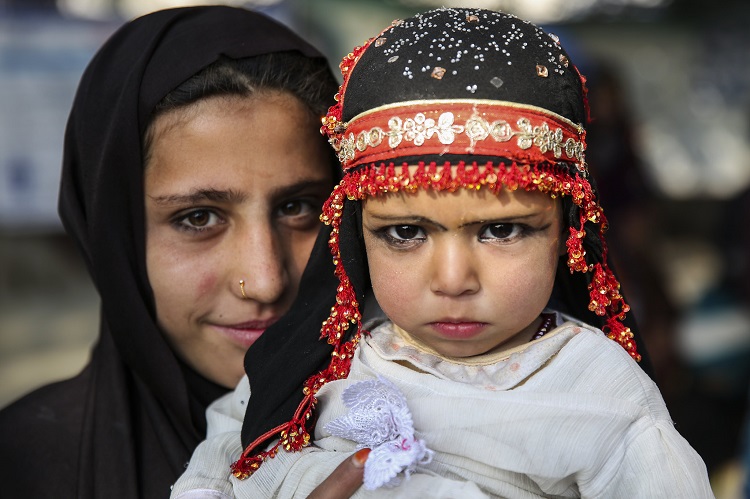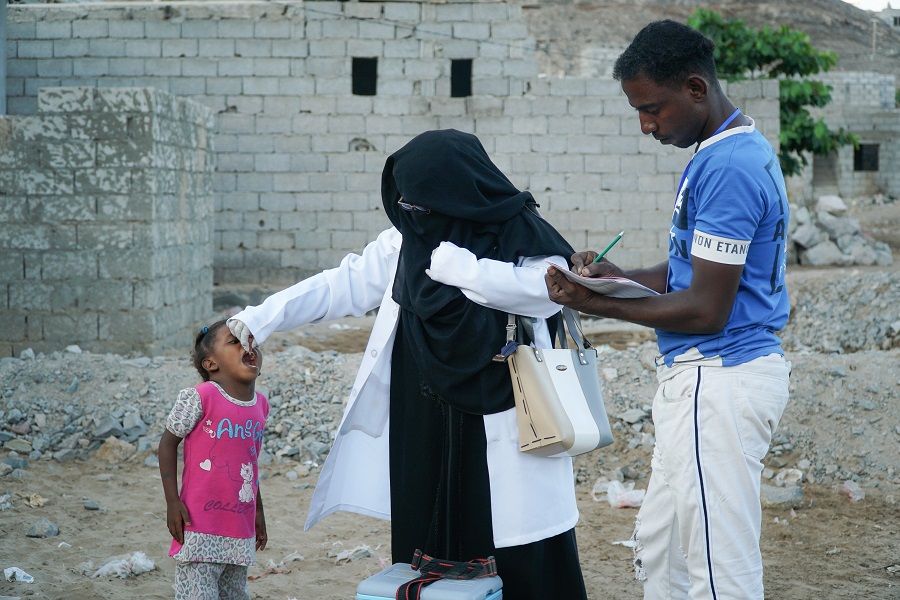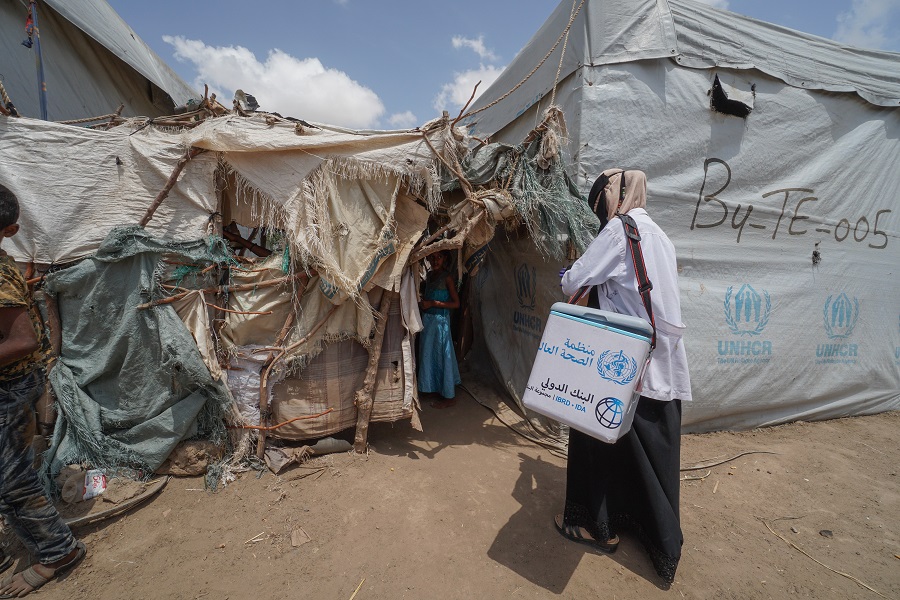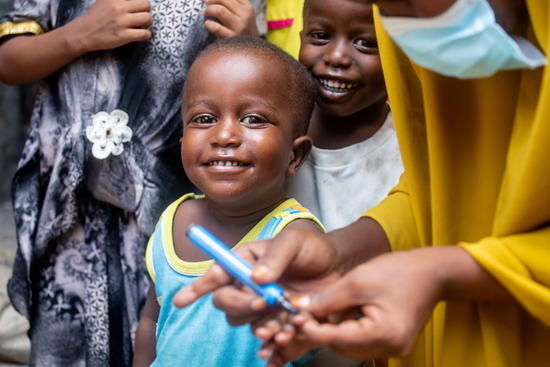Regional Subcommittee on Polio Eradication and Outbreaks meets
 8 July 2021 – The second meeting of the Regional Subcommittee for Polio Eradication and Outbreaks took place virtually on 1 July 2021, bringing together ministers of health and officials from across the Eastern Mediterranean Region.
8 July 2021 – The second meeting of the Regional Subcommittee for Polio Eradication and Outbreaks took place virtually on 1 July 2021, bringing together ministers of health and officials from across the Eastern Mediterranean Region.
Convened by Dr Ahmed Al-Mandhari, WHO Regional Director for the Eastern Mediterranean, the Committee brings together Member States to focus on renewing regional solidarity and commitment to achieve polio eradication.
The spread of polio in the Eastern Mediterranean Region remains designated as a Public Health Emergency of International Concern (PHEIC) under the International Health Regulations (IHR 2005). Wild poliovirus remains endemic in 2 countries (Afghanistan and Pakistan), and outbreaks of circulating vaccine-derived polioviruses type-1 (cVDPV1) and type-2 (cVDPV2) have also emerged, the latter expanding significantly in the Region.
Addressing the meeting, Dr Al-Mandhari said “While this assembly is still relatively new, I am heartened by the way that the Region is prioritizing this emergency. Poliovirus circulation inside our borders and inside our Region is our problem – and its eradication will be our solution.’
The forum was updated on the epidemiological situation and polio risks in the Region, as well as key programmatic developments, including the visit of the Polio Oversight Board to Pakistan in June and the launch of "Delivering on the Promise of a Polio-free World, the new Polio Eradication Strategic Plan 2022-2026", developed in close consultation across Global Polio Eradication Initiative (GPEI) stakeholders. The strategy lays out the roadmap to securing a polio-free world, promoting collective ownership and accountability, and enabling affected Member States to provide the necessary support, expertise and mobilization of resources to ensure a regional solution and long-term success.
In her opening remarks, Committee Co-chair, H.E Dr Hala Zayed, Minister of Health and Population, Egypt, congratulated the GPEI on the launch of the new strategy, reminding committee members that ‘a strategy means nothing if we don’t implement it. Empowering local leaders. Engaging communities. Identifying and vaccinating persistently missed children. This is where we must focus our energy and work closely with partners on the ground to have the most impact.’
Member States were also updated on preparations for the introduction of novel oral polio vaccine type 2 (nOPV2), an improved version of the workhorse of the polio programme. nOPV2 has the potential to quickly stop outbreaks of vaccine-derived poliovirus type 2 (VDPV-2) and was recommended by WHO for emergency use in November 2020. Preparations for the use of the vaccine, which are under way across the Eastern Mediterranean Region, include stringent requirements regarding cold chains, logistics, disease surveillance and communication capacity.
Dr Wahid Majrooh, Acting Minister of Public Health, Afghanistan, updated the forum on recent developments in the country. Although recording just one case of wild poliovirus to date in 2021, the polio programme is currently operating amid increasing insecurity and a crippling rise in COVID-19 cases.
Addressing the meeting, Committee Co-chair Dr Abdul Rahman Mohammed Al Oweis, Minister of Health and Prevention, United Arab Emirates, said that the United Arab Emirates ‘will continue to be a champion in the push to protect every last child from polio. I call on you, my dear colleagues, to do the same. We must continue to advocate for polio eradication in all possible international fora, including in key United Nations and high-level political forums.’
The Committee will next meet in October in the side-lines of the 68th session of the Regional Committee for the Eastern Mediterranean.
Related link
Regional Subcommittee holds inaugural meeting
16 March 2021
The brave women of Pakistan fighting polio
22 June 2021 – Female polio frontline workers are playing a key role to eradicate polio in Pakistan. Given their trusted roles and responsibilities, they contribute a lot towards vaccinating millions of children across the country.
Pakistan remains one of 2 countries where polio is endemic. With each polio campaign, it is essential that the entire country supports the successful implementation of campaigns which depend on the dedication of staff to reach all children.
Health interventions and immunization activities in the country are most effective when delivered by women. During each nationwide polio campaign, over 280 000 frontline workers are engaged across Pakistan, of whom 62% are women.
Polio vaccination against the odds in Yemen: dispatches from the frontline of polio eradication
 Muneera Abdo is one of thousands of vaccinators across Yemen working tirelessly to reach every last child with polio vaccine
Muneera Abdo is one of thousands of vaccinators across Yemen working tirelessly to reach every last child with polio vaccine
22 June 2021 – In Al-Buraika district, a poor neighbourhood in the port city of Aden in Yemen’s south, Muneera Abdo slowly makes her way through the sandy streets. With a scuffed plastic cool box hanging from a strap on her shoulder, Muneera knocks on the doors of houses often made of little more than discarded strips of tin.
Muneera is a polio vaccinator working in some of the most challenging territory on earth. She travels door to door, vaccinating children under 5 and raising awareness about the importance of vaccination among parents, many of whom are hesitant about vaccines or refuse outright to vaccinate their children.
“My happiest moment is when I serve my community and contribute to saving the lives of children,” said Muneera.
Muneera is one of thousands of vaccinators across Yemen. Their job is simple, yet overwhelmingly tough: reach every last child with polio vaccine, as many times as it takes to stamp out the virus. Vaccinators travel vast distances across deserts and over hills and mountains to reach communities living far from population centres.
Muneera’s job has never been so important. After more than 15 years without a case of polio, an outbreak of vaccine-derived poliovirus was confirmed in Yemen in 2020. Since then, millions of children have received oral polio vaccine on multiple mass immunization days, to boost immunity and stop the outbreak.
Tayseer Ahmed went door-to-door in Thula district, in the steep, long mountains of Amran governorate in the country’s north during the November 2020 and May 2021 campaigns.
“It’s a daunting job,” said Tayseer, “but tiredness fades away whenever I see parents bringing their children to be vaccinated without any hesitancy.”
 Sometimes, vaccinators in Yemen reach the end of a long and difficult road, only to continue on foot for hours more
Sometimes, vaccinators in Yemen reach the end of a long and difficult road, only to continue on foot for hours more
Conflict delays polio campaigns
Without vaccinators like Muneera and Tayseer, Yemen’s damaged health system and the poor sanitation in many villages could see the poliovirus easily spread from child to child across the country. The conflict and instability that have plunged parts of the country into a prolonged humanitarian crisis have lowered vaccination rates and delayed campaigns, leaving more children vulnerable to the virus.
As of 20 June 2021, a total of 34 children have been paralysed in the outbreak. This grim toll highlights both Yemen’s immunity gap and the challenges of delivering health care in a conflict. Immunization rates in Sa’adah governorate – the epicentre of the outbreak – have declined in the past 16 years since the last house-to-house campaign was conducted in 2004.
Responding to the urgent need to deliver vaccination services to all children in this governorate, WHO and UNICEF, in cooperation with the Ministry of Public Health and Population, have conducted health outreach activities there, targeting around 200 000 children under 5 with polio and other vaccines, and offering other health and nutritional support. Additional rounds of outreach will continue over the course of 2021.
The uptake of services has been informative: the main draw for families was the bundle of health services under the heading “Integrated Management of Childhood Illnesses” (IMCI), which supports children under 5 with health care, including vaccinations. In the first round of outreach, trained health workers provided IMCI treatment to 44 624 children under 5. Of these children, 4967 were under 2 months of age and were vaccinated for the first time.
But in order for these efforts to close Yemen’s immunity gap, they need to be sustained – no easy feat.
“Despite all security and humanitarian challenges, we’ve succeeded in conducting several rounds of vaccination campaigns across the country, reaching millions of children with polio vaccine. However, there's still so much work to be done to contain the current outbreak from spreading further,” said Dr Adham Abdel-Moneim, WHO Representative in Yemen.
As vaccinators like Muneera and Tayseer know, that work can only be done step by step, door to door, child by child. It is an immensely tough job – logistically challenging, but also physically and emotionally gruelling. For this reason, the people at the ground level of polio eradication often view their work not as a job, but as a calling.
“For me, protecting children against diseases is more humanitarian work than a paid job,” said Muneera.
Somalia: formal closure of the cVDPV3 outbreak
 A smiling child's left pinky is marked after he received bivalent oral polio vaccine in Banadir, Somalia, during the outbreak response vaccination campaign. The closure of the cVDPV3 outbreak is a win for public health in Somalia.
A smiling child's left pinky is marked after he received bivalent oral polio vaccine in Banadir, Somalia, during the outbreak response vaccination campaign. The closure of the cVDPV3 outbreak is a win for public health in Somalia.
29 March 2021 – Somalia’s outbreak of circulating vaccine-derived poliovirus type 3 (cVDPV3) has been successfully stopped, with no international spread. Dr Hamid Jafari, Director of Polio Eradication for WHO’s Eastern Mediterranean Region, declared the outbreak closed a full 28 months after this strain of polio was last detected in Somalia.
Seven children were paralysed by the type 3 strain in the 2018 outbreak, and sewage samples regularly monitored for poliovirus tested positive for cVDPV3 a dozen times, beginning March 2018. There is no doubt that the virus circulated widely around southern and central Somalia. Despite extensive disease surveillance measures, no cVDPV3 has been identified since 7 September 2018, when the last child developed paralysis.
Closing a polio outbreak is a formal process steered by a detailed checklist of surveillance indicators that must be met in order to show that the virus is not just hiding in a far-flung pocket but has truly disappeared. Sewage runoff is tested for virus, and health workers and community members actively search for paralysis in children, and then investigate any paralysis they do find to rule out polio. Accessing hard-to-reach communities is a challenge in Somalia, but a vital aspect of this work.


